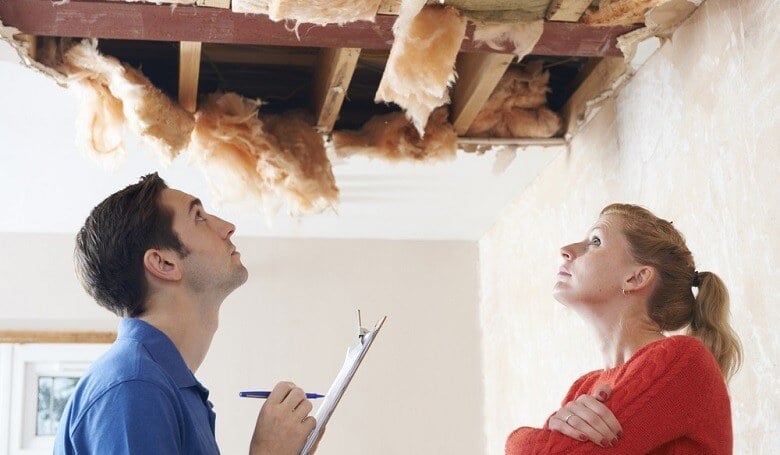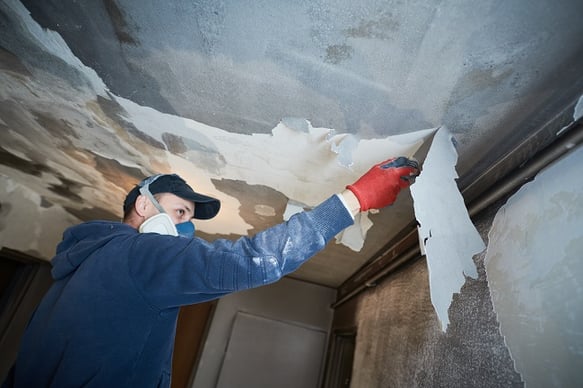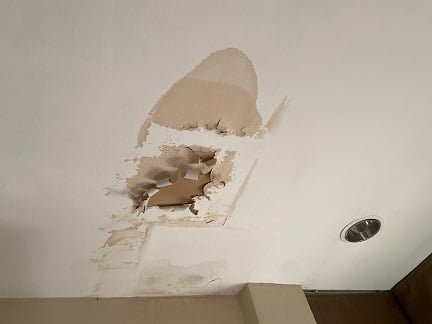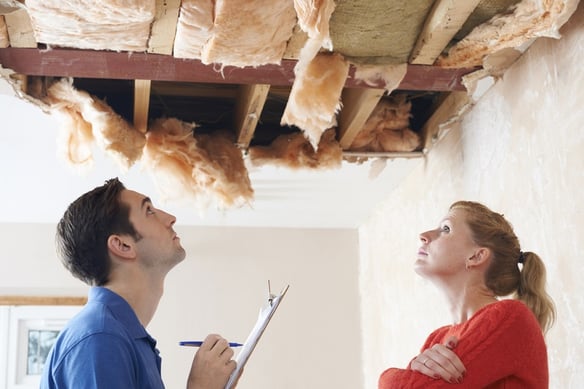
We pledge to provide straight talk from our NNINS Virginia insurance experts. Read the Northern Neck Insurance Integrity Promise.
Damage to your home's ceiling can be alarming. While water is often the culprit, there may or may not be an obvious correlating event, such as a bad storm, a load in the washer, or someone taking a shower. I remember stepping on a wet spot on the rug down in my basement years ago, looking up, and seeing a large water stain and sagging ceiling. It turns out I had hammered the nail into the wall straight through a plumbing pipe while hanging a picture in the dining room above the day before. What are the chances?
Natural disasters, excessive rain, and burst pipes, or leaky pipes like mine are the most common causes of ceiling damage. Checking for damage after these events, especially on your home's roof, can help you control repair costs and avoid structural damage and dangerous mold. The good news is home insurance can cover ceiling damage due to sudden and accidental named perils in your policy such as weather, fire, smoke, lightning, hail, wind, theft, vandalism, and more.
How does home insurance cover ceiling damage?
Every home insurance policy is different, but generally speaking, homeowners policies cover home ceilings from sudden accidental damage due to fire, severe weather damage, snow or ice, vandalism, explosion, and other natural calamities. Homeowners are responsible for the maintenance of their homes to prevent issues, and there are certain types of ceiling damage that are not covered by home insurance. Let's break it down.
What types of ceiling damage are covered by home insurance?
- Damage from burst or frozen pipes.
- Water damage from a sprinkler system in the course of putting out a fire.
- Damage from vandalism.
- Ceiling damage due to defective plumbing parts, as long as the damage has not occurred over time or is due to negligence.
- Damage from appliance overflow.
What types of ceiling damage are not covered by home insurance?
- Damage from poor design or substandard materials.
- Damage from mold or fungus, especially if you were aware of it and did not do anything to prevent the damage from occurring.
- Damage due to poor workmanship or issues in your foundation.
- General wear and tear and natural aging damages.
- Damage was caused by negligence ( like my nail job), lack of maintenance, or damage from pests.
- Damage resulting from a flood or earthquake- you must have extra coverage for these with most insurance carriers.
- Damage to a vacant house — unsupervised pipes can freeze and then burst, causing extensive ceiling damage.

Does homeowners insurance cover ceiling leaks?
Home insurance will cover water damage if the ceiling leak is sudden and accidental, but it will not cover every cause, as listed above. Roof damage due to poor maintenance and neglect and aging roofs needing replacement are the most common reasons that home insurance does not cover ceiling leaks. Home insurance also does not cover animal damage, which can cause roof damage and leaky ceilings. Squirrels are notorious for causing home damage to attics and roofs.

Does a policy protect against ceiling cracks?
Ceiling cracks can happen due to normal house settling, humidity, and sagging and are usually more aesthetically unappealing than harmful or serious. But you should always rule out water and roof damage and have a professional diagnose any serious cracks before attempting to fix them yourself. This is a good reason not to forego a home inspection before buying a new house. Licensed home inspectors primarily look at the four pillars which are the foundation, floor, walls, and roof. Cracking, sagging, shifting, or missing features on any of the pillars may be considered structural damage The good news is home insurance can cover ceiling cracks due to the named perils listed in your home insurance policy. Ceiling cracks may not be covered for the same reasons listed above.

Does homeowners insurance cover ceiling collapse?
Home insurance can cover ceiling collapse if it is caused by those named perils in your home insurance policy. But there are specific things not covered by your home insurance that can cause a ceiling collapse, including defective products and workmanship. Water leaking into the ceiling can cause wood rot to develop in the structural studs over time. The ceiling studs would be weakened, and any fasteners holding the ceiling in place would be compromised. As with any structural part of your home, maintenance is key, and home insurance does not provide coverage for the neglect of it.
We have answers to other frequently asked questions about home insurance coverage. Your local insurance expert is also an excellent source of advice about your homeowners coverage.
THE NORTHERN NECK INSURANCE INTEGRITY PROMISE — We pledge to provide straight talk and good counsel from our NNINS Virginia insurance experts through our blog. While we hope you find this to be a helpful source of information, it does not replace the guidance of a licensed insurance professional, nor does it modify the terms of your Northern Neck Insurance policy in any way. All insurance products are governed by the terms in the applicable insurance policy.

